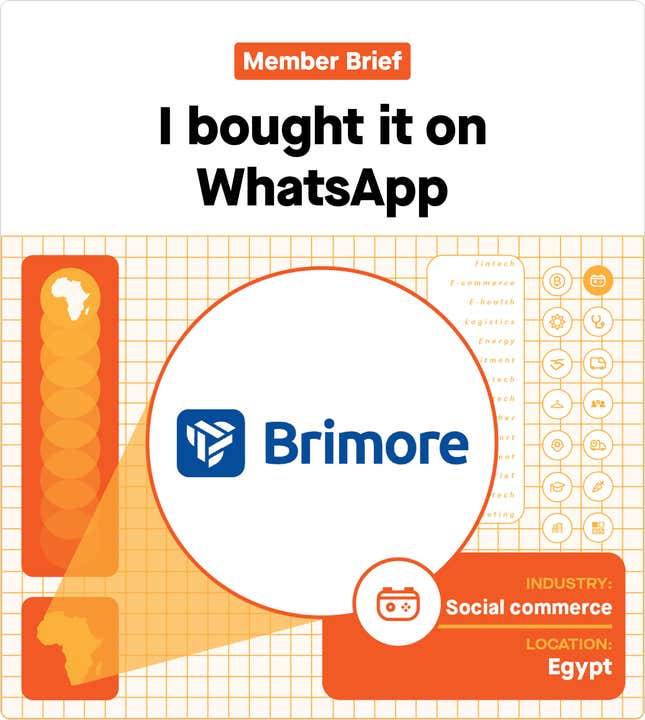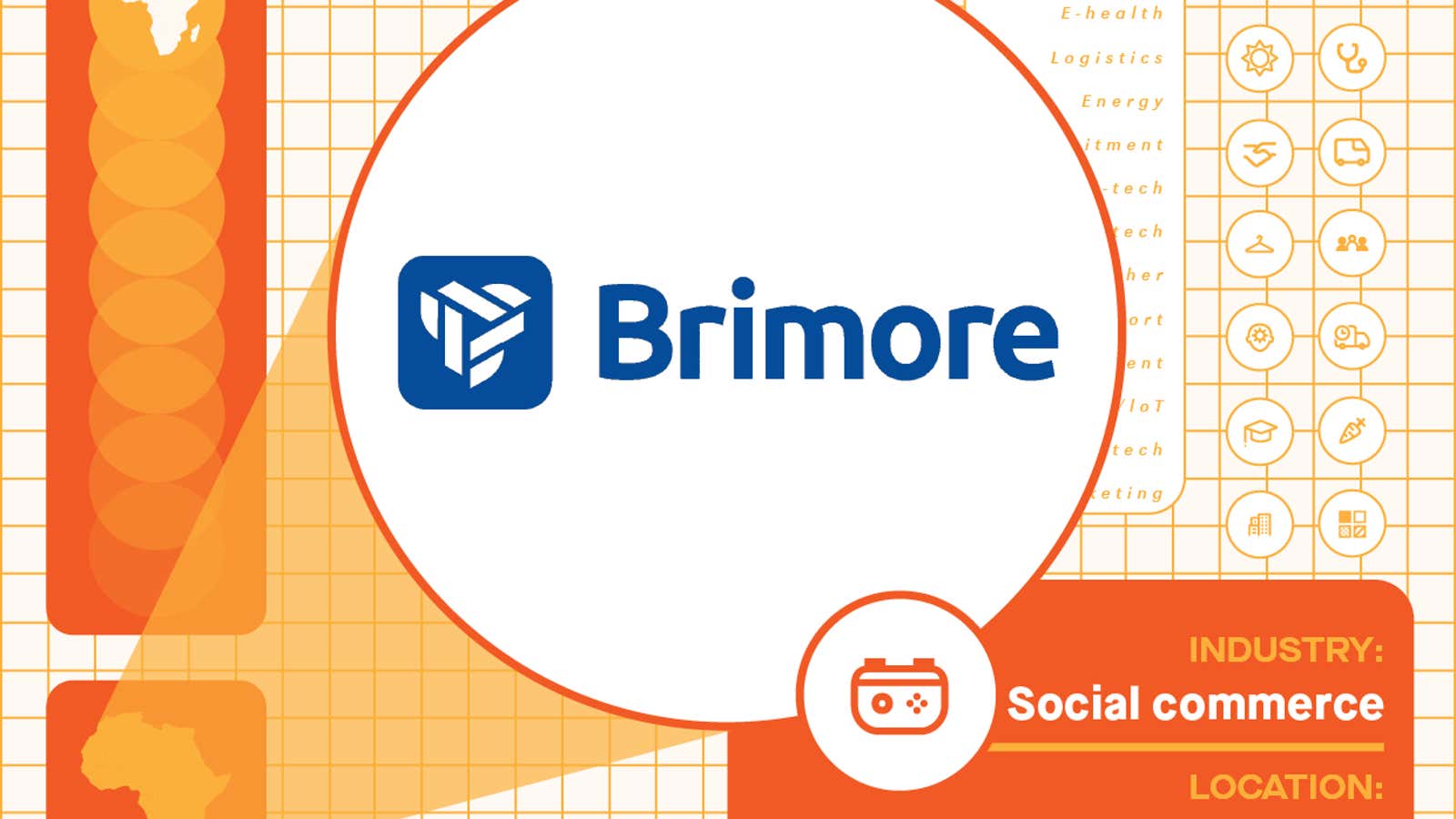
Hi Quartz Africa members,
Thanks to its youthful, tech-savvy population of 1.3 billion, Africa is well positioned for the rise of e-commerce, a shift hastened by pandemic lockdowns forcing even more purchasing online.
“Social commerce,” an e-commerce sub-genre, refers to trading and selling goods via social media—for example, snagging the latest trendy outfit using WhatsApp, Telegram groups, or Instagram pages. By making e-commerce even more convenient, social-commerce startups are looking to further disrupt retail, which remains dominated by brick-and-mortar stores that rarely offer credit sales, customized delivery, and other conveniences. Most social-commerce startups also use algorithms to drive targeted marketing.
While there are companies selling to customers directly via social media, some innovative and scalable startups are taking a two-tiered approach: Agents linked to larger suppliers market large lists of products to their social media circles. These agents don’t need to hold stock, but are able to tap into a supplier’s catalog of products and move them through their own social media networks for a commission.
In Africa, 83% of employment remains informal, and social commerce has the potential to tap into these familiar and agile ways of doing business. Perhaps most important, the growing sector is perfect for meeting Africa’s consumer where they spend most of their online time: using social media on mobile phones.
Cheat sheet
💡 The opportunity: Rising internet and smartphone penetration across Africa is giving rise to increased reliance on social media for communication and networking. This presents an opportunity for a fast-rising group of social commerce companies.
🌍 The roadmap: Social commerce startups across African markets are tapping into social media agents to reach larger circles through platforms like Facebook, Instagram, Telegram, WhatsApp, and Twitter. These agents take goods straight to interested end-users.
🤔 The challenge: Organizing Africa’s informal retail distribution platforms into formal channels is a key opportunity that social commerce and e-commerce companies are pursuing. Expensive and poor connectivity is also a challenge on a continent that has a sizable portion of its population in poorly serviced rural areas.
💰 The stakeholders: Social media sales agents, e-commerce and social media startups, digital businesses, development financiers, international finance institutions, fintech firms, and consumers.
By the digits
92%: Share of small and medium enterprises that utilize social media for their business in Kenya
$8.9 billion: Value of the social commerce industry in Africa and the Middle East by 2022
55.2%: Projected growth of social commerce in Africa and the Middle East between 2022 and 2028, at which point the market is expected to hit $13.3 billion
520 million: Estimated number of online shoppers in Africa by 2025
The case study
Name: Brimore
HQ: Egypt
Founders: Mohamed Abdulaziz and Ahmed Sheikah
Founded in 2017, Brimore is an Egyptian social commerce startup that almost exclusively works with women resellers to sell products through social media on behalf of manufacturers. Brimore currently partners with 300 manufacturers and 75,000 women resellers across Egypt.
While the blossoming of Egypt’s tech-startup ecosystem is attracting increased venture financing, Africa’s overall funding landscape remains tilted against female founders. (In 2021, only 6.5% of funding to African startups went to companies with female CEOs.) By focusing on this overlooked group of entrepreneurs, Brimore was able to attract funding from global venture financiers that include the IFC, Algebra Ventures, and Endure Capital.
The company raised $25 million this year—including $5 million from the World Bank’s International Finance Corporation (IFC)—which brought total VC funding to $40 million. In February, Brimore also invested $5 million into Egyptian logistics and last-mile-delivery startup Milezmore, and it’s now gearing up to expand into Kenya and Morocco.
In conversation with
Ahmed Sheikha, co-founder and chief business officer for Brimore, believes in increasing income-generating opportunities for African women. Here are some choice quotes from our conversation:
⚙️ On how Brimore works:
“From the supplier’s side, they list their product with us. We align on market, strategy, pricing, and competition, and we place it on our mobile application. Once the product is on [the] app, a notification is sent to the resellers. They check the new products and start sharing the material, pics, and details, and pricing of the products on social media with friends and family and networks. The selling part is mainly on social media.”
💪 On what motivated the founding of Brimore:
“We saw a market opportunity: If you have a new brand that no one knows about, you usually need to spend heavily on marketing, sales, and distribution to make sure these products are available for the consumer first; and then you start your sales, which is very hard. So we thought of creating a network of micro-sellers who can sell to their friends and family and to their close social circles through social media.”
🤔 On personal motivations:
“I was intrigued by the kind of opportunity, savings, and income that this type of business could generate for all stakeholders. You help people get decent income, help them learn more skills, and help them influence those around them by reselling the products through social media. The use of technology was also a distinct way to bring an unorganized retail market to an organized framework.
Social commerce deals to 👀
Wasoko, a Kenyan B2B e-commerce startup, raised $125 million under a Series B round this year. Formerly Sokowatch, Wasoko allows informal retailers to restock supplies using their mobile phones under a buy-now-pay-later scheme. The new funding will help Wasoko consolidate its pan-African presence through expansion into Nigeria and other countries in southern Africa.
Kenyan social commerce start-up Tushop raised $3 million in a pre-seed capital round in April. The company will use the funding to expand its team and continue scaling. Founded in 2021, Tushop organizes community leaders to collect orders from communities at a fee for their efforts which also includes delivery of groceries.
Elloe, a US-based social and e-commerce startup focused on the Kenyan market, raised $1 million in a pre-seed funding round, and will use the money to expand into Southeastern Asia markets. The company focuses on AI-driven commerce operations through social messaging platforms.
From Nigeria, Rabawa is an African social commerce startup that raised $163,000 funding last year. It will use the capital to strengthen its e-commerce operations, which leverage social and video commerce platforms. The company allows resellers to promote and market goods on behalf of producers to end users via social media platforms.
More from Quartz Africa
📱 Social commerce is becoming an important business model in Africa
📹 African diplomats are livestreaming to China’s consumers
🇲🇦 Morocco’s e-commerce boom outlasted its lockdown
🛒 Why central Africa is lagging behind in e-commerce
🤝🏽 Why B2B is key to unlocking Africa’s e-commerce potential
🎵 This brief was produced while listening to Gambia and Jarabi (Beloved) by Sona Jobarteh (Gambia).
Have a highly motivated rest of your week,
—Tawanda Karombo, Quartz Africa contributor based in Harare
One 😃 thing
While central Africa significantly lags behind the rest of the continent in terms of internet adoption, it has a relatively high use of social commerce. One survey in Cameroon found that 68% of respondents had purchased items through Facebook, while 88% had purchased through Facebook-owned WhatsApp.
